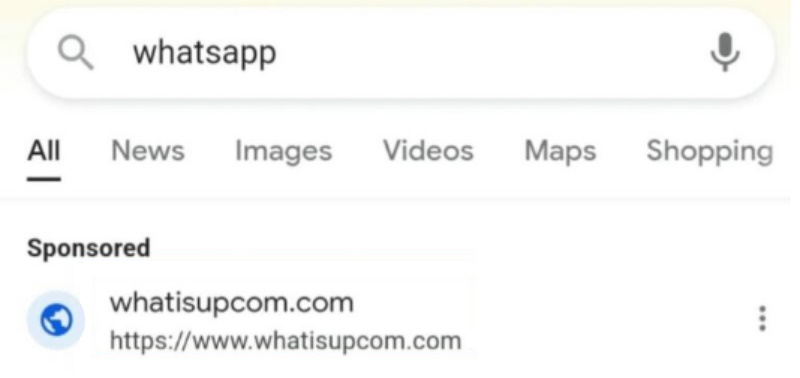Scammers are rife, as normal, this time they have been noticed shopping for up areas on Google search adverts, with a purpose to masquerade as a frankly fairly legit-looking model of WhatsApp internet.
The hyperlink to the faux WhatsApp website was discovered on the high of Google, which means the folks behind it will need to have invested an excellent sum of cash into getting the malicious hyperlink the place it could possibly be seen, as TechNave (opens in new tab) experiences (through NLT (opens in new tab)).
From the pictures, the cast website is seems as a close to an identical copy of the official WhatsApp internet software, the one discernible distinction being the URL:
What’s up com.com… actually? I imply, possibly with out my glasses on I might have been fooled, or with a giant previous hangover. Nonetheless the positioning itself is very convincing, and even reveals up with a faux QR code to scan which might immediately hearth over your login particulars to the offending occasion.
Apparently there are some things the hackers might have ignored, nonetheless, that would give susceptible folks an opportunity to double take earlier than they hand their particulars over.

First off, there is not any method to swap the language to something however Simplified Chinese language—a little bit of a giveaway as WhatsApp is out there in lots of languages. Secondly, and most surprisingly, since WhatsApp has been blocked in China since 2017 the bulk of people that can truly learn the positioning have not been in a position to entry WhatsApp for years with out bypassing the block.
Fascinated by it, these might look like oversights to us, however might be techniques the hackers have chosen to run with on goal. Perhaps there’s nonetheless a substantial amount of seek for WhatsApp in China. Or maybe the hackers see themselves as “Villain Killers,” focusing on those that would bypass the rule of the Chinese language authorities for the vile act of utilizing free, safe messaging companies.
Nevertheless these hackers see themselves, Google is onto them, having fortunately eliminated the adverts. Nobody seems to have shut the faux WhatsApp website down but, nonetheless, so keep vigilant if anybody invitations you to WhatsApp through a dodgy trying hyperlink.
As ever, it pays to be vigilant of any hyperlink on-line; this is not the primary time that Google has been promoting a rip-off website on the high of its search outcomes. Earlier within the yr EVGA, ex-graphics card producer and peripheral maker, was the topic of an analogous rip-off, with a website pretending to be EVGA’s popping into the highest spot through a paid-for advert.
The faux EVGA website has lengthy since been eliminated, however we suspect it tricked just a few throughout its time.

